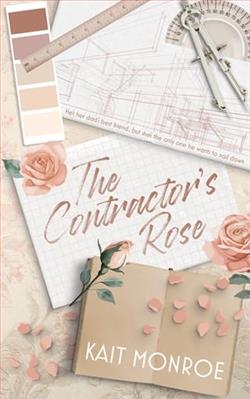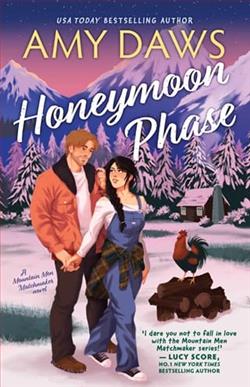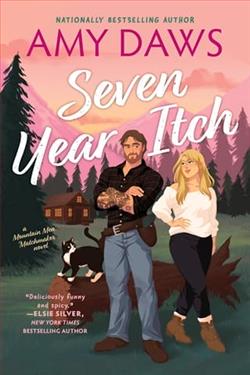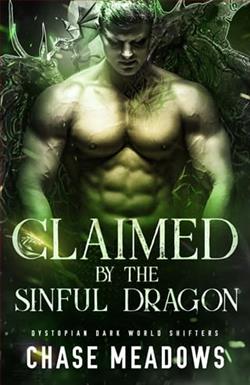Page 6 of Keeping Kate
“Well...I attempted to demonstrate my affection by, well, kissing her. Then she hit me with the butt of my pistol.”
“Ah.” Alec glanced up. “And why was she in your tent?”
“I found her wandering in the camp after dark. She said she was looking for a kinsman, but seemed to be in the wrong encampment. She was weary and lost, and I offered my help.”
“Did she give you her name?”
“Marie. It’s...all I remember, at any rate.”
The laundress picked up a feather pillow and smacked it hard, then laid it on the bed and smoothed the blankets again.
“Was she Scots or Highland?”
“She spoke excellent English, without a trace of brogue. And she understood French when I, er, recited some poetry to her.”
“Poetry.” Alec wrote it down. The fellow had been well and truly caught by this clever seductress. “So you say she was bonny?”
“Aye, young and delicate somehow. Her hair was ginger, I think, or blonde, and her eyes were blue or gray. She wore a blue gown, or perhaps green, with a lace cap, and over it all a dark cloak and hood. She smelled like lavender,” he said dreamily.
Alec took up the pen. “Eyes of uncertain color, hair an indeterminate shade, speaks French and English, smells like a sachet...not very specific. Anything else?”
“She was very fetching,” Heron said. “She had a sort of allure and innocence all at once,” Heron said. “I wanted to protect her as well as lie with her, and I thought she invited that—but in the end, I believe she had not. I felt rather besotted. Perhaps the rumors that she is a fairy or practices magic are true.”
Alec set down the pen. “The others reported similar impressions. Perhaps she drugged you by putting something in your cup of chocolate.”
“I find that hard to believe. I never saw her add anything. And she was so sweet, so kind and gentle. I trusted her.”
”But your sore head convinced you otherwise,” Alec said. While Heron nodded and fidgeted with his hat, Alec glanced again at the laundress, who was laying out a shirt and a pair of knitted tartan stockings from the basket.
“Miss,” he said. “Those are not my garments.”
She half-turned, shrugged. “Leine,” she said, patting the shirt.
Explaining that they were not his was hardly worth the effort, he thought. He’d accept the things regardless and find the owner later. Wiggling his toes inside his buckled shoes, he realized that he had worn the same shirt, waistcoat, stockings, and plaid for too long. Clothing had to last indefinitely in the field, but he preferred fresh shirts and stockings if he could get them. The clean bed linens the laundress had brought were an unexpected boon. He had already noticed, though he had been here but a few days, that the local washerwomen were efficient at their work, and here was another come with clean things already.
Narrowing his eyes, he studied the girl, whose back was turned as she worked. She seemed plain enough, with little trace of the irresistible female described by the men who had met theintriguanteKatie Hell. Though she did have lovely eyes, a pretty gray or blue, which he had glimpsed when she had dropped the papers.
Thoughtfully, he watched the Highland girl.
Ridiculous, he told himself. Katie Hell was too clever to enter a small tent with two officers inside. He glanced at Lieutenant Heron. “That will be all. I will give the notes to General Wade. He is anxious to find the woman who has been harassing his officers.”
“Sir, I would not call it harassing. It was more like...a pleasant encounter. She was no threat, and rather enchanting.”
“But you discovered otherwise, remember. She is a clever vixen, sir, who may have turned some soldiers’ hearts and turned the rest on their ear.”
“Yes, sir. I suppose that is true.” The officer glanced down.
“Dismissed, Lieutenant. But first, allow me to replace your supply of cocoa powder.” Alec stood. “My aunt posts tins to me often. Far too often, as I have more than I can possibly use.” He indicated a small table that held a jumble of cups, spoons, a silver pot, and stacked black-and-gold tins of tea, cocoa, and coffee. Choosing three tins of each kind, he handed them to Heron.
“Thank you. This is very generous.”
“Not at all. I prefer stronger drink, but my aunt will not post whisky.”
Heron laughed, expressed thanks again, and left the tent.
Alec returned to the desk. The laundress crammed the used bed linens into her wicker basket, then picked it up and turned to leave. He looked up, and again something tugged at his memory. Had he seen her before, outside of the camp?
He studied the concealing plaid, the uptilt nose, the curve of her cheek. Just a bonny Highland girl, he decided, with a bonny shape hidden under the layers of clothing that seemed typical to the women of the hills—baggy gown, apron, petticoats too, he supposed, under the bulky plaid. The notion she could be anything more left him. The laundry lass was nothing like the clever wanton in any of the descriptions.
He folded into his chair and took up the broadsheet illustration once again. “Katie Hell,” he murmured, “you’ve tied a few knots in the British military fabric, lass.”
The girl walked past him, basket in her hands, heading for the doorway. Again a feeling nudged at him. “Miss,” he said.
She stopped, back turned. “Oiche mhar,”she answered.
“Oik-uh-vahr,” he repeated, his accent stiff with disuse. “Not ‘ood night’ just yet, if you please. Come here.”















